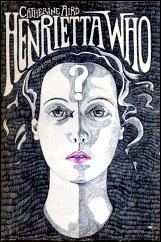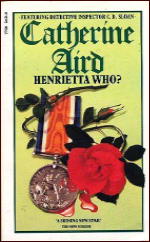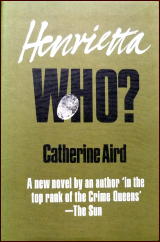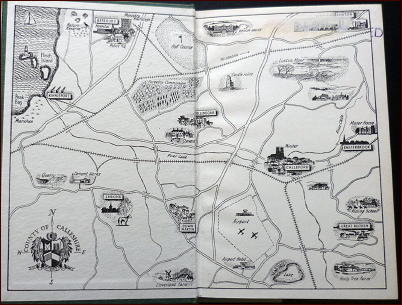Fri 22 Jun 2012
CATHERINE AIRD – Henrietta Who? Doubleday, US, hardcover, 1968; Bantam, US, paperback reprint, 1981. Macdonald, UK, hardcover, 1968; Corgi, UK, paperback, 1988.

Aird’s primary mystery-solving character is Detective-Inspector C. D. Sloan, who’s appeared in all but one of her books. Whether he’s been promoted since his early outings — this was only his second appearance — I can’t tell you, since (I am embarrassed to say) I have not read any of his more recent ones.
And if there is anything to be learned about his private life in any of his other books, it would be more than may be found in this one, which is nothing at all.
In Henrietta Who? he’s the Head of the Criminal Investigation Department for the police in Berebury, and as we’re told, it’s a very small Department. His assistant on this case — and also along many of those to follow, I believe — is Constable Crosby, who (as we shall see) is not always the brightest of subordinates. His Superintendent is a gruff, old-fashioned sort of fellow named Leeyes.
If there were first names given, I missed them. I do not even believe Sloan’s initials were stated, except on the back cover. The emphasis is on the mystery, and for the most part, it’s a good one.
This was Aird’s third mystery. Her second one, A Most Contagious Game, was the standalone, the only one that Sloan did not appear in. While she knew what she wanted to do — and for at least 90% of the book she succeeded in doing exactly that — there are a couple of weak points that a more experienced writer might have been able to improve upon.

The story: When a woman is killed as a pedestrian by an automobile whose driver didn’t stop for help, it wouldn’t ordinarily bring Sloan in, but the woman had a daughter, and the pathologist who examines the body says she never had a child.
The girl’s name is Henrietta, who never knew her father, and abruptly called home from university, she is suddenly not only an orphan, but she has no idea who she is. No birth certificate (possibly stolen), no passport, no other form of identification. A total mystery.
Sloan is working almost entirely in the dark, with the only information provided by the girl, and she might not be telling the truth. It makes Henrietta Who? a rather unique tale, as far as I know, and the intellectual stimulation generated by the problem Sloan and his cohorts must solve is, in a word, contagious.
Don’t get me wrong. This is no dry exercise in mental calisthenics. Aird has a dry, understated sense of humor that must be like mine, as it appeals to me immensely. On page 71, Sloan is bouncing ideas off Crosby, and he doesn’t seem to be getting anywhere:

Crosby took another sandwich and thought about this for the length of it. Then “Grace Jenkins must have had a birth certificate.”
“Wright,” said Sloan automatically.
Crosby, who thought Sloan had said “Right,” looked pleased and took another sandwich.
“Though,” continued Sloan, if she’s Wright, why bring Jenkins in at all, especially if she’s not married to him.”
Crosby offered no opinion on this.
Great fun, and the plotting very nearly works. But as far as I can tell, there’s a huge hole a small lorry could plow through, and that’s because it doesn’t seem likely the person who’s the second murder victim — Henrietta’s “mother” was the first — would have kept quiet about the secret that the woman had been keeping for all of those years, not now when she’s dead, and with the newspapers and radio on full alarm about her death.
Other than that, with all of the red herrings and other false trails that have to be sorted through, this is one fine case of detection — everything else falls into place just the way it should.
[UPDATE] 06-22-12. The very plain cover of the British hardcover edition shown above on the lower right has a very nice surprise inside. Scaled down in size, it may not be as impressive here as it would be if you were holding the book in your hand, but a map of the area where a fictional crime is committed is always a bonus as far as I’m concerned, and this one is a nice one indeed:

When I wrote this review in 2003, I didn’t specify a count of how many Sloan books there were at the time, but there have been three written since, for a total of 22, the most recent one being Past Tense, published in 2010 when the author was 80. I should check. I don’t believe that many of the last few have been published in paperback in the US, and if I’m correct about that, it’s a shame, as Aird is an author who ought to be better known, and she isn’t.
June 22nd, 2012 at 2:36 pm
Sorry, but Aird, contrary to my expectations, is not for me.
I read, both recently, ‘The Stately Home Murder’ and ‘The Religous Body’ .
I found the banter between Sloan and his young ,proletarian sidekick mildly amusing,but the detection business took an eternity in both volumes (realistic, possibly, but boring), and when finally the affairs were wrapped up, I had stopped caring Whodunnit .
The Doc
June 22nd, 2012 at 4:30 pm
I remember reading both of those, Doc, but I can’t find my reviews of either one, if I wrote them. So I can’t say for sure, but I don’t think I’d disagree with your assessment, only possibly in degree.
Even though the primary protagonists are policemen, I’d call the books “cozies,” and anybody who’s undecided about reading any of them can take it from there.
What I don’t quite understand is why Bantam stopped reprinting them in paperback. They seemed to be successful, with many of the first eleven in the series having several printings. Starting with #12, A DEAD LIBERTY, though, they appeared in the US only as hardcovers. They’re in demand, too, as used copies of these later ones are rather pricey now, if you were to go looking for them on ABE and so on.
For a complete list of Aird’s books, here’s where to go:
http://www.fantasticfiction.co.uk/a/catherine-aird/
June 22nd, 2012 at 5:04 pm
I used to have a number of her books, but I don’t have any now. I recall Ed Lauterbach thinking she was under appreciated and finding fault with The Oxford Companion to Crime & Mystery Writing for not including an entry for her. Of course, she was serving as a contributing editor to the volume and wrote a number of the entries, so she may have had something to say about her inclusion or exclusion.
June 22nd, 2012 at 6:37 pm
Mine are both contemporary Rue Morgue Press, so if you are not a collector, but just a reader…
The Doc
June 22nd, 2012 at 7:42 pm
Doc
I had completely forgotten that Rue Morgue has been printing the Aird books, seven now in total. I think once you hit 70, you start forgetting things almost as fast as you learn new things.
In any case, Rue Morgue and Catherine Aird are a perfect fit for each other. Quiet, traditional mystery fiction with a hint of humor.
The only surprise is that Aird is a lot less vintage than their usual stock in trade; that is to say, mysteries from the 30s and 40s verging into the 1950s.
June 22nd, 2012 at 8:14 pm
I read Henrietta Who? a few years ago; I found the plot pretty riveting but the book left me unsatisfied overall. I’ve read a few more of her titles since then, and, I don’t know – they always leave me feeling like something’s missing. They feel very clinical – Sloan and Crosby are two-dimensional and most of her other characters are paper-thin, too.
I think Aird’s style is witty, literate and charming but I just don’t much *care* what happens to her characters. I have another one of her books that I picked up at a library book sale laying around; I should give it a go. I really want to like her, and sometimes I do, but I always feel that some sense of fullness, of engagement, that’s missing.
June 22nd, 2012 at 9:48 pm
Kacper, I agree.
As I said about Sloan in my review:
“And if there is anything to be learned about his private life in any of his other books, it would be more than may be found in this one, which is nothing at all.”
The detectives are there only to tackle the puzzle, the old-fashioned approach, not today’s, whereby we learn all there is to know about the characters and their lives, which become embedded pieces of the story.
June 23rd, 2012 at 7:53 am
Real people confronted with a mystery, a task, events, tend to involve the reader- like- what would I do now, were I the Detective, or another person in the novel.
The Doc
June 23rd, 2012 at 8:56 am
I’m going to have to think about this, but I wonder if there are any characters in fiction about whom I really do care. Of course, there are those where I want to find out what will happen to them next, but is that the same thing? I am reminded of the exchange between Mark Van Doren and his wife when she came upon him reading a mystery that she recognized as not being by one of the better writers. She asked why he was bothering with it and he replied “Because there are people in this book and I want to find out what will happen to them.”
June 23rd, 2012 at 9:35 am
Characters you care about vs characters you only want to find out what happens to them next?
No, not the same thing, but how close are they? The first must be a subset of the other, mustn’t it?
I think the first must be more common in literature than in mystery fiction.
It’s an interesting question. I’ve never thought about it, phrased this way.
June 23rd, 2012 at 3:05 pm
I’m reminded of Kurt Vonnegut’s rules for writing – one of them is that you always should give the reader at least one character to root for. It’s true that there are many mystery novels that I read only to find out what happens next, without much emotional investment. However, off the top of my head, Reginald Hill is one writer in whose books I always find characters to genuinely care about, and I’ve been gutted at some of the characters he’s killed off. I also get very emotionally invested in Louise Penny’s books.
It’s definitely an intriguing thought. I do read most mysteries for escapism and an intriguing, surprising plot – the ‘what happens to them’ – but I guess intuitively I am always looking for some level of emotional investment, and some writers deliver that more than others.
June 24th, 2012 at 10:27 am
Want a character people (not me) care about beyond what happens next? Sherlock Holmes.
June 24th, 2012 at 3:43 pm
Without quite responding to Michael, but asking a question that has occurred to me several times, even before he posted the preceding provocation:
How many viewers of the various present-day incarnations of Sherlock Holmes (on movies and TV) are likely to go to the actual Holmes stories, the ones written by Watson, and enjoy them?
June 24th, 2012 at 8:56 pm
The British TV version and the Basil Rathbone’s Holmes are the only times I have liked Sherlock. I have disliked the books from a very early age and have tried many times but failed to change my opinion of them.
What is interesting about characters, especially with TV and film, is how they can become a part of your life. People today still discuss “The Woman” and other parts of Holmes’ “life.”
Certainly the role playing and dressing up that happens at Comic Book and other Entertainment Conventions show how characters from books, TV, and film have become an important part of people’s lives.
Traditional mystery fans may at times prefer the plot over character. But character over mystery and plot is common in hardboiled mysteries and thrillers. Any successful series such as Holmes and Christie’s Miss Marple and Poirot survives based on how much the reader is interested in the character as well as what is happening.
As for Steve’s question in #13. The fact the traditional mystery is still successful hints some would love the old Holmes, but the popularity of the thriller or character driven books hint more would find them disappointing.